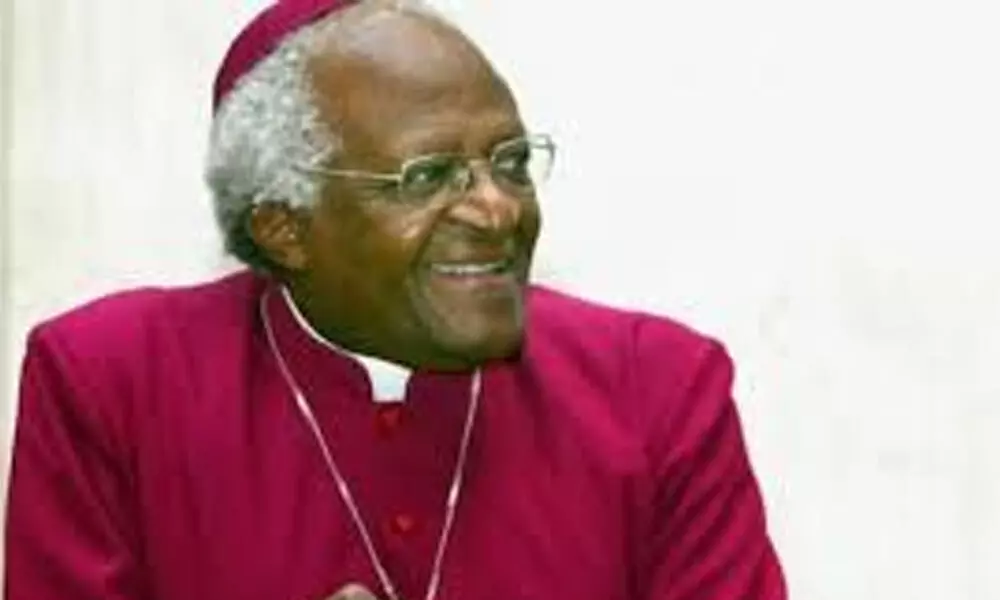Father of South Africa's 'rainbow nation'

Desmond Tutu
When South Africans woke up on the morning of April 7, 2017 to protest against then President Jacob Zuma's removal of the respected Finance Minister Pravin Gordhan, Archbishop Tutu left his Hermanus retirement home to join the protests.
When South Africans woke up on the morning of April 7, 2017 to protest against then President Jacob Zuma's removal of the respected Finance Minister Pravin Gordhan, Archbishop Tutu left his Hermanus retirement home to join the protests. He was 86 years at the time, and his health was frail. But protest was in his blood. In his view, no government was legitimate unless it represented all its people well. There was still that sharpness in his words when he said that, "We will pray for the downfall of a government that misrepresents us." It is on these principles that he had fought valiantly against the system of apartheid and became an outspoken defender of human rights and campaigner for the oppressed.
But Archbishop Tutu didn't stop his fight for human rights once apartheid came to a formal end in 1994. He continued to speak critically against politicians who abused their power. He also added his weight to various causes, including HIV/AIDS, poverty, racism, homophobia and transphobia. His fight for human rights wasn't limited to South Africa. Through his Peace Foundation, which he formed in 2015, he extended his vision for a peaceful world "in which everyone values human dignity and our interconnectedness." He also became relentless in his support for the Dalai Lama, whom he considered his best friend. He condemned the South African government for refusing the exiled Tibetan spiritual leader a visa to deliver the "Desmond Tutu International Peace Lecture" in 2011.
Early years, Archbishop Tutu came from humble beginnings. He was born on October 7, 1931 in Klerksdorp, in the North West Province of South Africa where his father, Zachariah was a headmaster of a high school. His mother, Aletha Matlare, was a domestic worker.
One of the most influential figures in his early years was Father Trevor Huddleston, a fierce campaigner against apartheid. Their friendship led to the young Tutu being introduced into the Anglican Church. After completing his education, he had a brief stint, teaching English and History at Madibane High School in Soweto; and then at Krugersdorp High School, west of Johannesburg; where his father was a headmaster. It was here that he met his future wife, Nomalizo Leah Shenxane.
It is interesting that he agreed to a Roman Catholic wedding ceremony, although he was Anglican. This ecumenical act at the very early stage in his life gives us a hint of his commitment to ecumenical work in later years. He quit teaching in the wake of the introduction of the inferior 'Bantu education' for black people in 1953.
In 1955 Tutu entered the service of the church as a sub-deacon. In 1962, he went to London to pursue further theological education with funding from the World Council of Churches. He earned a Master of Theology degree, and after serving in various parishes in London, returned to South Africa in 1966 to teach at the Federal Theological Seminary at Alice, Eastern Cape. He returned to Johannesburg as the dean of Johannesburg and the rector of St. Mary's Anglican Parish in 1976.
It was at St Mary's that Tutu first confronted the then apartheid Prime Minister John Vorster, writing him a letter in 1976 decrying the deplorable state in which black people had to live. On 16 June Soweto went up in flames, when black high school pupils protested against the forced use of Afrikaans as a medium of instruction and were mowed down by apartheid police.
Bishop Tutu was thrust deeper and deeper into the struggle. He delivered one of his most passionate and fiery orations following the death in detention of the black consciousness leader, Steve Biko in 1977. His role as the General Secretary of the South African Council of Churches, and later as the rector of St Augustine's Church in Orlando West in Soweto, saw him become an ardent critic of the most egregious aspects of apartheid.
With his growing political activism in the 1980s, the Arch became a target of the apartheid government's full-scale victimisation and faced death threats as well as bomb scares. In March 1980, his passport was revoked. He was awarded Nobel Prize for Peace in 1984 for being a unifying leader in the campaign to resolve the problem of apartheid in South Africa. He went on to receive more distinguished awards. He became the Bishop of Johannesburg in 1984, and the Archbishop of Cape Town in 1986.
In the following four years leading up to the release of Nelson Mandela after 27 years in prison, the Arch had his work cut out for him. This involved campaigning for international pressure to be brought on the apartheid through sanctions. After 1994, he headed the Truth and Reconciliation Commission. Its primary goal was to afford those who committed human rights abuses – for or against apartheid – the opportunity to come clean, offer legal amnesty to deserving ones, and to enable the perpetrators to make amends to their victims.
Two greatest moments in his personal life took his theological outlook beyond the confines of the Church. One was when his daughter Mpho declared she was gay and the church refused her same sex marriage. The Arch proclaimed If God, as they say, is homophobic, I wouldn't worship that God. The second was when he declared his preference for assisted death. South Africa is blessed to have had such a brave and courageous man as The Arch, who truly symbolised the idea of the country as a "rainbow nation."
South Africa will feel the loss of the moral direction of this brave soldier of God for generations to come. Hamba kahle (go well) Arch.
(Courtesy: The Conversation; Writer is
a staff at University of KwaZulu-Natal,
Durban, South Africa)








